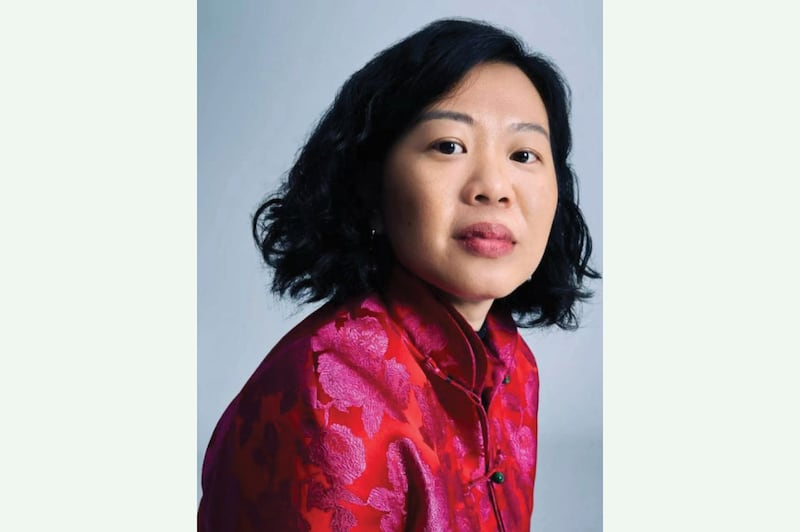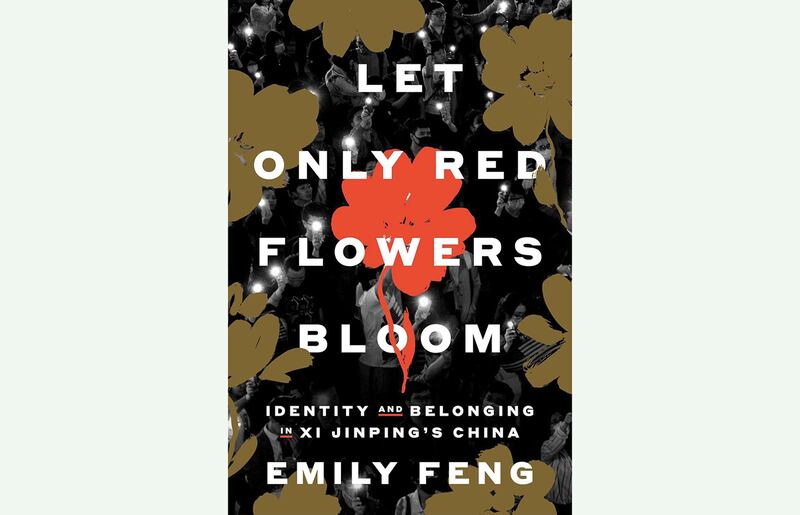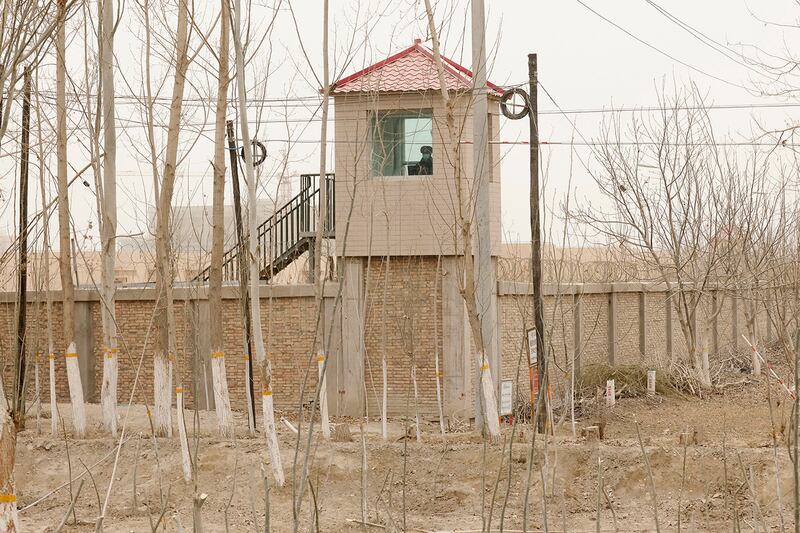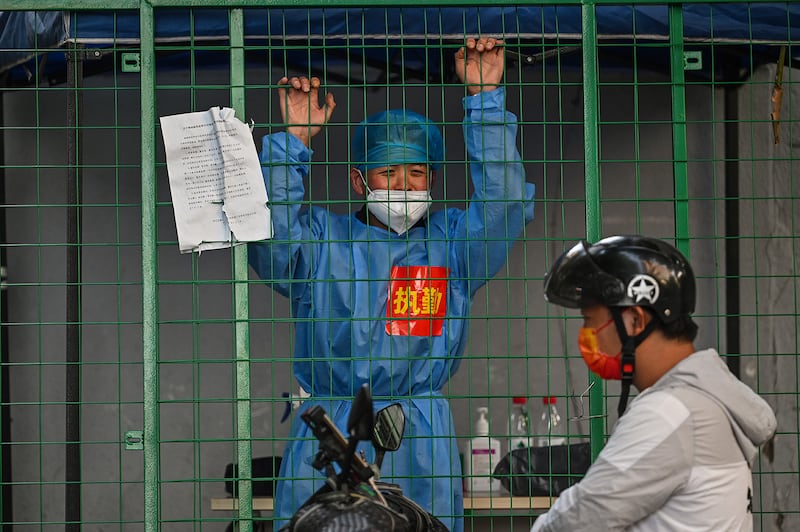After nearly a decade covering China as an NPR correspondent, Emily Feng returned to Washington, D.C. Her reporting spanned a period of profound social and economic change : Xi Jinping’s consolidation of power; the Xinjiang detention camps; Hong Kong’s pro-democracy movement and the crackdown against it; China’s strict zero-COVID policy; and the country’s transformation into a surveillance state.
Ultimately, Feng was caught in the crossfire of the U.S.-China rivalry — her visa was unexpectedly rejected, forcing her to relocate to Taiwan for the final years of her reporting.
Her new book, “Let Only Red Flowers Bloom,” is a reflection on the search for identity and belonging under Xi Jinping’s rule. It will be published March 18. The following interview has been edited for length and clarity.

RFA: You moved to China in 2015 at the age of 22. What was the biggest question you had, and did you find the answer?
Emily Feng: I wanted to see China for myself. I had visited family in the south a few times, but I was curious about how the country was changing, especially under Xi Jinping, who was then in his third year as leader. I wondered if China would continue opening up — economically, politically and culturally. I had just started consuming more Chinese-language culture, and I was interested in how cultural production would evolve.
The day I arrived was about a week after the July 9 crackdown on human rights lawyers. I didn’t realize it at the time, but that was a watershed moment in Chinese politics. It shaped the China I would experience over the next several years.
RFA: The July 9 crackdown shocked many. What were its lasting effects?
Emily Feng: It had systemic impacts. Many influential lawyers lost their licenses — people who had been shaping ideas about China’s legal and political future. It wasn’t just about individuals; it rippled across corporations, organizations and society as a whole.

RFA: Your book’s title, ‘Let Only Red Flowers Bloom,’ is a twist on Mao’s famous slogan, ‘Let a hundred flowers bloom.’ You write that a source told you, ‘That’s the state now.’ What did they mean, and why did it stay with you?
Emily Feng: The title reflects a duality. On one hand, it’s about celebrating the diversity that exists in China — different voices, perspectives and identities, along with varying views on the role of private business, ethnicity and languages beyond Mandarin Chinese. On the other hand, it reflects how the state is increasingly trying to constrain that diversity.
One of the people I interviewed told me, ‘At this point, the state only lets one color of flower bloom—red flowers.’ That quote captured the theme of my book: the tension between the natural diversity within Chinese society and the state’s efforts to control it.
RFA: You spent nearly a decade covering China. What’s the biggest shift you’ve seen?
Emily Feng: The Communist Party is much more present in everyday life. When I first moved there, political control felt more distant for many people. But over the years, the government became more involved — even in the small details of daily life. COVID-19 made that even more visible, with strict movement controls and surveillance.
I felt it in my reporting as well. When I first got there, there was concern that talking to people could get them in trouble. People needed to be anonymous for their safety. But as my years in China continued, the level of surveillance, particularly online, really intensified.
That said, I want people to know that there are still many voices in China. Despite the tightening restrictions, there are still compelling stories to tell, and I hope more journalists can continue working there.

RFA: Were there any key moments during this period when you felt that social control was tightening?
Emily Feng: I started thinking about this issue because of what was happening in Xinjiang. In 2017, I began reporting on Xinjiang, and at first, I had only heard about the existence of some camps.
But as I continued following the story, I realized that the Xinjiang issue and the situation of the Uyghurs had much broader significance for the entire country. It wasn’t just a problem in the western region — it was connected to policies on ethnicity, identity, language and culture at the time. It also tied into a larger question of what kind of nation China and the Communist Party were trying to create. So, starting from Xinjiang as an entry point, I began to ask: Why does identity play such a central role in contemporary Chinese politics?
RFA: How did you build trust with the people you interviewed, and how did you weigh the risks, both for yourself and for them?
Emily Feng: It’s a daily conversation — with editors, with yourself, and, most importantly, with your sources. Many of my stories weren’t about government leaks; they were about personal experiences. Earning trust meant showing that I was willing to listen and making the effort to be there.
Sometimes, it took years for people to open up. One Uyghur family I interviewed, for example, only felt comfortable sharing their full story after they had processed what had happened to them. In China, I might have to spend a lot of time exploring 10 different stories, but there’s only a 20% or even just a 10% chance of success.
RFA: Did you ever face danger yourself?
Emily Feng: Yes. I was investigated for my work, and my news organization was audited as part of the U.S.-China media tensions. Many reporting trips were cut short, and interviewees were sometimes detained while I was speaking with them. People I talked to risked losing jobs or public benefits. It’s not a black-and-white situation, but it’s something I had to be aware of when reporting in China.

RFA: Your reporting often focuses on human stories. Under Xi’s rule, how is the younger generation navigating identity?
Emily Feng: For me, identity was the central theme in all the stories I found most interesting in China. It’s also why I decided to collect many of them and write a book about it. I argue that identity is key not only to understanding this vast country, which is so important economically and geopolitically, but also to understanding how China sees itself and, consequently, what its future holds.
Every decade or so, there’s this question: What kind of country can China become? The expectations of what Chinese people thought their country would become 10 years ago — before COVID, before the economic downturn — are vastly different from what a 20-year-old in Beijing or Shanghai envisions today.
The theme of identity also allowed me to give a personal twist to these big, weighty questions that often dominate newsroom discussions. What gets lost in much of that coverage is the fact that these issues affect real people. Despite being a country so far away from the U.S., I wanted to humanize these stories, to make readers ask, ‘What if this were happening to my friend?’ I wanted to help people feel what it’s like to live in their world, because that’s what I’ve lost since leaving China — and, I think, what we’ve all lost now that there are fewer reporters on the ground in mainland China.
RFA: In this era of tighter control, how do people carve out personal or ideological space?
Emily Feng: It’s increasingly difficult. Many of the people I interviewed for the book have since left China. Some persisted for years, even decades, within the system. I tell the story of a former state prosecutor who later became a human rights lawyer. She worked inside the system for years before stepping out to fight it.
There’s a lot of resilience among people, and a good sense of survival about when to be outspoken and when to be quieter. But I think even that small degree of flexibility is disappearing. Most of the characters in the book have since left China since I wrote the first draft.
RFA: Foreign correspondents have played a crucial role in shaping global understanding of China. With fewer journalists on the ground, what do you hope your coverage conveys to readers who have never been to China?
Emily Feng: I want people to see that, at the end of the day, people are people everywhere. No matter the country or language, human nature is universal.
For me, this book is also personal. My parents were born in China, and I still have family there. I never held a Chinese passport, but I have a deep connection to the place. When I lived there, I realized I had seen only a tiny bit of it. I had seen it through my family’s eyes, through their immigration story. But there are many different versions of China, depending on who you are in China.
Edited by Boer Deng.
